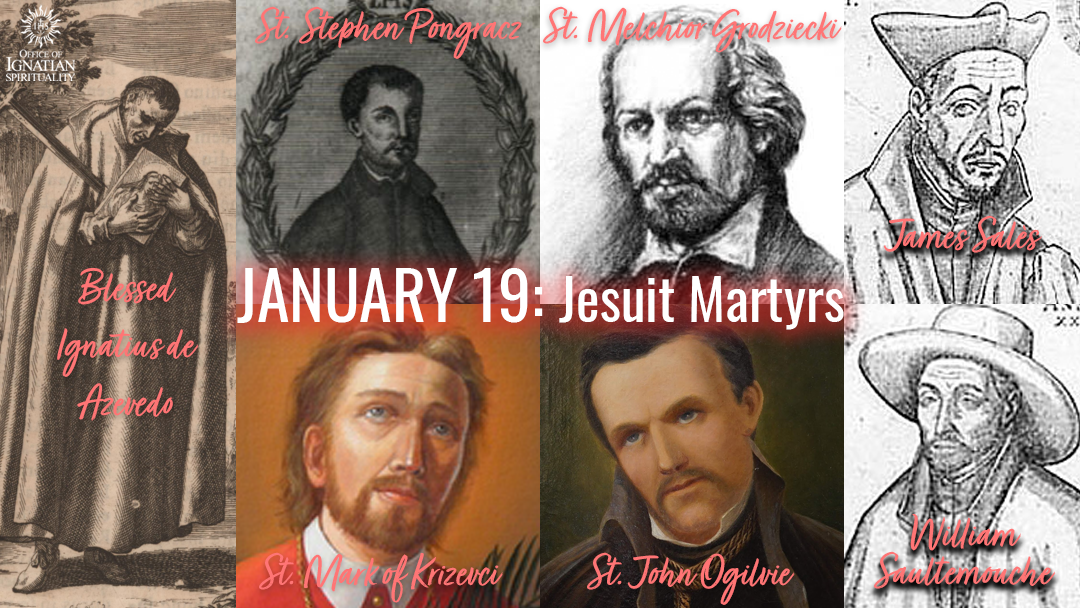January 19
Jesuit Martyrs
Sts. John Ogilvie, Stephen Pongracz, Melchior Grodziecki, Mark of Krizevci; Bl. Ignatius de Azevedo & companions, James Salès & William Saultemouche
Optional Memorial
Scripture Readings
Click here to find the daily readings for this day. [or see Common of Martrys]
Reflection on Today’s Feast
By Fr. Eric Studt, SJ
Today, we celebrate a number of saints and blessed, including several Jesuits, all martyred for their faith:
Sts. Stephen Pongrácz, Melchior Grodziecki, & Mark of Križevci, martyrs of Kosice
Bl. Ignatius de Azevedo & Companions, martyrs of Brazil
Bl. James Salès & Bl. William Saultemouche, martyrs of France
Also celebrated today is St. John Ogilvie, who was martyred in 1615 while ministering to the faithful in his native Scotland.
Scotland was a tough place to be a Catholic in the latter half of the 16th and in the 17th centuries. The brand of Protestantism trumpeted by John Knox and his cohort of firebrand preachers was violently intolerant of the smoldering remnants of papistry in the country. Jesuits in particular were seen (incorrectly, of course) as a sect of lying, conniving, regicidal fanatics. John Ogilvie lived in these confusing times. It is the generation after Mary Queen of Scots, the last Catholic monarch of Scotland, and the long era of her Protestant son, James VI, later James I of England, whose persecution of Catholics was every bit as ruthless as Elizabeth’s had been in England. When John Ogilvie comes onto the scene, Scotland is already Protestant, but even the noblest of families could harbor papist sympathies.
Ogilvie was born in 1580 into a noble, mostly Protestant family. Typical of adolescent aristocrats of his time, he travelled to the Continent for his education. In Leuven he converted to Catholicism with the help of the Jesuits and later joined the Austrian Province of the Society. After his ordination and years of badgering Father General to be sent to Scotland, he was missioned to his homeland in 1613. His mandate was to provide support and encouragement to small communities of persecuted Catholics. As with other recusant priests such as Edmund Campion and Robert Southwell, Ogilvie moved secretly from house to house hearing confessions and celebrating masses. As a priest in Scotland, he himself was illegal. Discovery would have meant not only his own death, but the death of the people he was known to have served. About a year after his mission began, he was discovered, arrested, tortured, tried, and hanged for treason.
As in Ogilvie’s context, the decision to become a Jesuit today is radically countercultural. Nowadays, no one will hang us for it, but many will not understand, and some may be hostile. What grounded Ogilvie’s decision was a deeply personal commitment to the person of Jesus, to the Church, and to service. He signed up for a life of humble, unacknowledged, even secretive apostolic work. In an age of moral uncertainty and alternative facts, his example encourages us to remain faithful while being respectful of those who disagree with us. Scotland and England in the 16th and 17th centuries were rife with unfounded Jesuit conspiracy theories. Ogilvie had to contend with this fake news at his trial. Even as he was being tried for treason, he admitted that he would freely shed blood to defend the King, but that he would under no circumstances submit to the King’s spiritual authority. Ogilvie’s unshakeable faithfulness as well his respectful and intelligent defense won the admiration of his prosecutors and listeners, so much so that his full sentence of being drawn and quartered was not carried out.
In times of suffering, John Ogilvie also shows us how to connect with others through humor, wit, and simple acts of kindness. A story about his first trial has him warming himself by a fireplace when an obnoxious Highlander approached and threatened to throw him into the blaze. Ogilvie’s response: “There is no more suitable time than now if you have decided to throw me in the fire, for I am all but frozen, but you must have a care not to scatter cinders and coals over the house for you yourself will be made to clean them up.”
Today, Scottish society is largely secular. Although there may be pockets of anti-Catholic sentiment, the prevailing impression is that religion has ceased to be relevant. Sound familiar? Perhaps like John Ogilvie, your own journey has revealed to you a countercultural insight, namely that Jesus is relevant, that what you believe and how you worship really do matter, that supporting and encouraging your community of faith is a cause worth devoting your life to. Perhaps, like John Ogilvie, you are able to see your background and your gifts not so much as obstacles to your Christian commitment, but as opportunities to offer humble service. It can be easy to get swept up in romantic notions of Ogilvie’s heroism and courage. In the end, however, he was simply a person who put his faith in Jesus and his concern for his fellow Christians at the center of his life, and he refused to budge from that center, whatever the cost.
St. John Ogilvie and all Jesuit martyrs, pray for us!
The Jesuit Lectionary is a project of the Office of Ignatian Spirituality and the USA East Jesuit Province Vocations Office. For more information about becoming a Jesuit, visit BeaJesuit.org.


